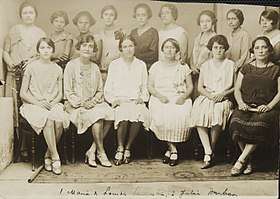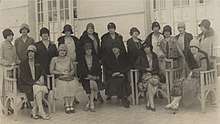Feminism in Brazil
The origins of feminism in Brazil trace back to the 19th century. During the Empire of Brazil, some jurists attempted to legalize women's suffrage, with or without the consent of the husband. Later, the republican constitution of 1891 didn't exclude women from voting, because they weren't considered individuals who could have rights. That made some women request, without success, their inclusion among the voters. The 1891 constitution initially had a clause that gave women the right to vote, but it was abolished in its last version because the idea that politics was not an honorable activity for women prevailed.
Some historical moments of this time were important in the advance of women's struggle, such as the 1917 strikes, the rise of the Communist Party of Brazil in 1922 and, in the same year, the Modern Art Week in São Paulo. In 1919, Bertha Lutz, who is considered a pioneer in the Brazilian feminist movement along with Nísia Floresta, founded the Brazilian Federation for Women's Progress, which fought for voting rights and the right to work without the husband's authorization.
Rio Grande do Norte and Minas Gerais were pioneer stats in legalizing the female vote. The first registered female elector was Celina Guimarães Viana. Celina, in 1927, invoked article 17 of Rio Grande do Norte's electoral law, which states: In Rio Grande do Norte, all citizens who meet the condictions determined by Law, will be able to vote and be voted, without gender distinction. On 25 November 1927, she requested to be included among the voters, a request which judge Israel Ferreira Nunes approved.
History
The republican constitution of 1891 already assured women the right to vote, depending on how it was interpreted. Article 70 stated that are electors all citizens who are above 21. The term "citizens", according to the interpretation of the time, referred only to men. Women only effectively got the right to vote in 1932.
20th century


In Brazil, the feminist movements were inspired by the European struggles. Nísia Floresta is one of the first to manifest herself as a force in the pursuit of equality for women, as well as Bertha Lutz, who created the Federation for Women's Progress, in 1930; and Jerônima Mesquita, who fought for women's right to vote and tool part in several social and philanthropical activities.[1][2][3]
1960s and 1970s
In the 60s and 70s, feminism arose throughout Europe and within the US and got its impulse from the political and cultural upheavals those regions were going through, which challenged the conservative values of society, and in this context The Second Sex by Simone de Beauvoir was published.[1][2][3]
However in Brazil the scenario was very different. The country was going through a right-wing military dictatorship. In the height of repression, the feminist movement emerged again through the hands of Romy Medeiros da Fonseca. This movement widened the range of the demands, including the principle of equality between husband and wife in marriage and the introduction of divorce in Brazilian legislation.[1][2][3]
1980s
From 1980 onwards, the accomplishments of the feminist movement were great, as a consequence of all the previous years of struggle. In 1980, the show TV Mulher (TV Woman) aired in the Rede Globo TV network, in which themes such as kitchen and decoration were discussed. Later, the necessity to talk about the body, sexuality and freedom arose. The female spectators sent their doubts concerning sexual freedom and curiosities about their own bodies to the host, Marta Suplicy. A need for liberation was perceptible in women. Brazilian music was taken by singers of great success, such as Simone, Rita Lee, Maria Bethânia, Fafá de Belém and Joana. Many songs turned into icons of the time: Começar de novo (Simone), Atrevida (Simone), Cor de rosa choque (Rita Lee).[1][2][3]
Concerns about the intersection of race and class with feminism also began developing, with events such at the National Meeting of Black Women highlighting ways in which contemporary feminism was not addressing the concerns faced by poor women and women of color.
| Wikimedia Commons has media related to Feminism in Brazil. |
Historical Notable Persons
.jpg)
Marie Rennotte A native Belgian and naturalized Brazilian teacher and physician, who was active in the fight for women's rights. Rennotte directed the obstetrics and maternity unit of the Maternity Hospital of São Paulo.
In 1901, she was admitted as a member of the São Paulo branch of the Brazilian Historic and Geographic Institute. She conducted research at the surgery of the Santa Casa da Misericórdia on the effects of chloroform as an anesthetic from 1906 to 1910. Then she traveled to Europe to study how to establish a Red Cross Branch in São Paulo. Upon her return she founded the local branch in 1912, opened a nurses training school, and began a campaign to found the first children's hospital in São Paulo. She continued to practice medicine through the mid-1920s, but increasingly in the late 1920s and the 1930s became more involved in the international feminist movement and scientific conferences.
In 1922, she founded the Aliança Paulista pelo Sufrágio Feminino (Paulistan Alliance for Women's Suffrage). By the late 1930s, suffering from ill health, blindness and deafness, she was granted a state pension, which she collected until her death in 1942. She is remembered for her work to improve women's educational and health care options, and women's rights to employment and citizenship. She is also recognized as one of those who defined feminist thought in Brazil during the 19th century.
Patricia Acioli - February 14, 1964 in Niterói, August 12, 2011 in Niterói) was a Brazilian judge and feminist. She was the first judge to be murdered in the State of Rio de Janeiro. Acioli championed the rights of battered women and fought against organized crime and corrupt police officers. She was murdered by masked men on motorbikes outside her house in 2011. Eleven police officers, including its chief, were convicted of planning and executing the murder.
See also
- Women's rights in Brazil
- Ele Não movement – 2018 demonstrations against Jair Bolsonaro's presidential campaign
References
- IV Seminário CETROS Neodesenvolvimentismo, Trabalho e Questão Social – Fortaleza – CE – UECE – Itaperi, ed. (29–31 May 2013). "As Trajetórias e Lutas do Movimento Feminista no Brasil e o Protagonismo das Mulheres" (PDF).
- Universidade Federal de Santa Catarina (ed.). "O feminismo no Brasil: suas múltiplas faces".
- "Uma História do Feminismo no Brasil" (PDF). 2003.
